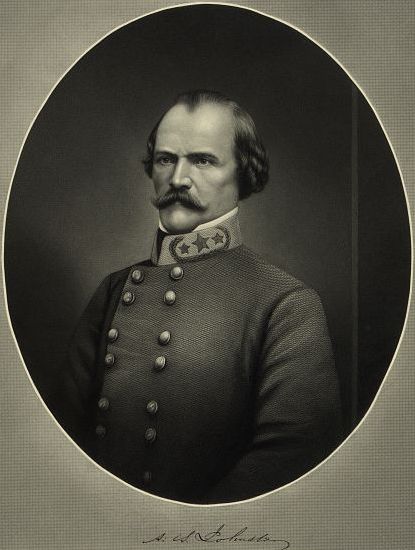About Publications Library Archives
heritagepost.org

Preserving Revolutionary & Civil War History

Preserving Revolutionary & Civil War History

At the beginning of the Civil War it was almost universally agreed that the finest soldier, North or South, was Albert Sidney Johnston. But his Civil War career was a definite disappointment to the Confederacy. The Kentucky-born Johnston was appointed to West Point from Louisiana and graduated eighth in the class of 1826. After eight years of service he resigned to care for his terminally ill wife. A failure at farming, he went to Texas and joined the revolutionary forces as a private. He rose to the forces’ chief command as senior brigadier the next year.
He served as secretary of war in the Republic of Texas and commanded the lst Texas Rifles in the Mexican War. Reentering the regular army in 1849 as a major and paymaster, he became colonel, 2nd (old) Cavalry, in 185 5. For his services in the 1857 campaign against the Mormons in Utah he was brevetted brigadier general. He resigned his commission on April 10, 1861, but did not quit his post on the West Coast until his successor arrived.
Relieved, he began the long trek to Richmond overland. Meeting with Jefferson Davis, he entered Confederate service where his assignments included:
As the second ranking general in the Southern army he was given command of the western theater of operations. Establishing a line of defense in Kentucky from the Mississippi River to the Appalachians, he held it until it was broken at Mill Springs in January and at Forts Henry and Donelson in February 1862. Abandoning Kentucky and most of Tennessee, he fell back into northern Mississippi where he concentrated his previously scattered forces.
In early April he moved against Grant’s army at Shiloh. In what was basically a surprise attack, he drove the enemy back. While directing frontline operations he was wounded in the leg. Not considering his wound serious, he bled to death. Grant, writing in his memoirs, considered Johnston as having failed to live up to earlier expectations.
(Roland, Charles P., Albert Sidney Johnston: Soldier of Tbree Republics)